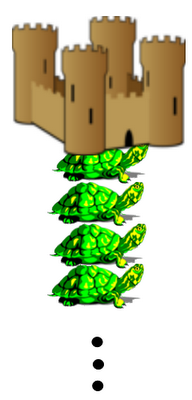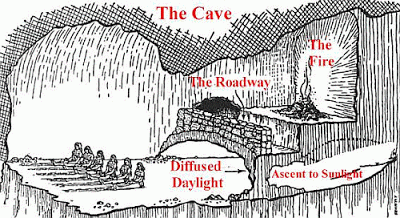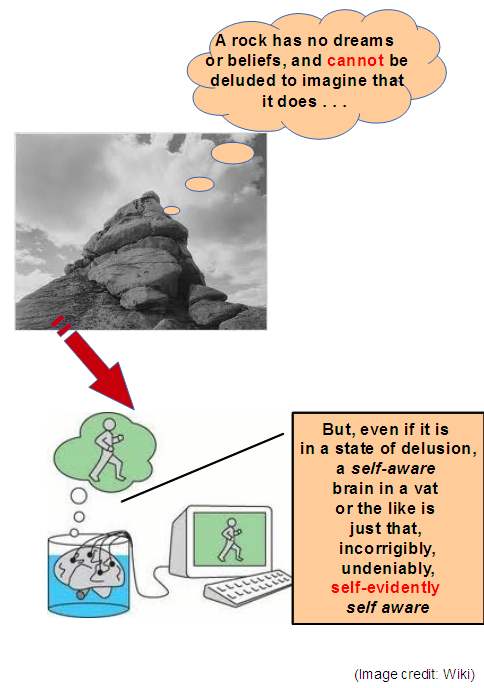
It seems necessary — in the teeth of too much obfuscatory rhetoric spread out like a squid escaping behind a cloud of ink — to lay out some basics of reasoning in general and about morality in particular for record, yet again. This time, by clipping, slightly adapting and highlighting an in-thread comment here:
________________________
>> Try (as a first example and slice of the cake with all the key ingredients):
3 + 2 = 5
||| + || = |||||
This is self evident, as one who understands what it asserts (in light of conscious experience of the world) will see it to be true and that it must be true on pain of immediate, patent absurdity.
Similarly, for “error exists” [just try to deny this and see where it gets you!], or “I am conscious” — as rocks have no dreams and those who dream, even if deluded, are conscious.
Notice, these are first truths, one does not have turtles all the way down or turtles in a circle or let’s arbitrarily pick a turtle and call it no 1.

They are not grounded on other claims and chains of arguments, but on insightful rational understanding of the world as we experience it.
Nor is it circular to accept such, so any arbitrary “turtle” will do.
These, we understand and we see — if we are willing — that to deny is patently to be absurd. Which, we are also going to be directly aware of.

Try:
3 + 2 = 4
||| + || = ||||
Take away 4 both sides:
| = __________, i.e, absurd.
When it comes to start-points for reasoning, we have self-evident first principles of right reason.
A good beginning is a bright red ball on a table, A.
This effects a world-partition, W = { A | NOT_A }
Once we understand that distinct identity, it immediately follows that the law of identity, that of non-contradiction and that of the excluded middle obtain. A is itself, LOI. A cannot be simultaneously ~A, LNC. Anything, x in W, will be A, or ~ A but not both or neither.
These are self evident to the point where the attempt to deny and utter or even think such will have to use the same principles. And don’t even bother on trying Q-mech. To get to Q-mech and to assess results in Q-mech, we have to be based on the laws all the way. (If you want more details, cf the Weak argument correctives.)
Then, we look at the weak form principle of sufficient reason: for any A we can ask, why A and seek/hope to find a good answer. Which has as corollary, cause and effect, especially the issue of on/off enabling causal factors — think, Boy Scouts fire triangle.
SETs are important and ground rationality.
Period.
Now, the pivot of debate is moral SETs.
The same principles and context apply, noting that a key feature of normal consciousness is conscience.
Normal to the point that if one asserts that it is essentially delusional in asserting that we are governed by ought, that would put us in a Plato’s Cave absurd world of shadow shows that would bring our general rationality under hyperskeptical doubt.

In short, the simplest reply is, anything that implies general delusion of a major feature of rational consciousness undermines the foundation of rationality and refutes itself. Errors are particular, not global.
And of course we come to: it is SET that it would be wrong to kidnap, torture, rape and murder a child. With corollary, that if such is in progress we are duty-bound to intervene to save the child from the monster.
Just try to directly deny it: no takers, the game is to try to obfuscate, undermine, divert, etc.
All are absurd and speak volumes.
There are moral SETs, we are quite aware of many of them, and we have to reckon with our being under moral government, as testified by the normally functioning conscience — as that we live in a world of light, sights and sounds is testified to by other senses.
The best explanation is that we live under a moral governor.
That is, there is a world-foundational IS that adequately grounds OUGHT.
The only serious candidate, being the inherently good, Creator-God.
And to me, that is the real root issue, as that cuts across major worldview tastes, preferences and assertions; some of them dressed up in lab coats.
So, let’s just cut to the chase scene.>>
________________________
And so, the challenge becomes, to take rationality seriously, including about moral concerns.
Especially in the teeth of the sort of radical relativism and amorality dressed up in the lab coat that we for instance see here in an August 1995 Sci Am article by dean of the New Atheists, Richard Dawkins:
Nature is not cruel, only pitilessly indifferent. This lesson is one of the hardest for humans to learn. We cannot accept that things might be neither good nor evil, neither cruel nor kind, but simply callous: indifferent to all suffering, lacking all purpose [–> It escapes Dr Dawkins that we may have good reason for refusing this implication of his favoured ideological evolutionary materialism] . . . .
In a universe of electrons and selfish genes, blind physical forces and genetic replication, some people are going to get hurt, other people are going to get lucky, and you won’t find any rhyme or reason in it, nor any justice. The universe that we observe has precisely the properties we should expect if there is, at bottom, no design, no purpose, no evil and no good, nothing but pitiless indifference [–> As in open admission of utter amorality that opens the door to nihilism] . . . . DNA neither cares nor knows. DNA just is. And we dance to its music. [“God’s Utility Function,” Sci. Am. Aug 1995, pp. 80 – 85.]
With that on the table, common sense about morality becomes even more important to bear in mind. END

